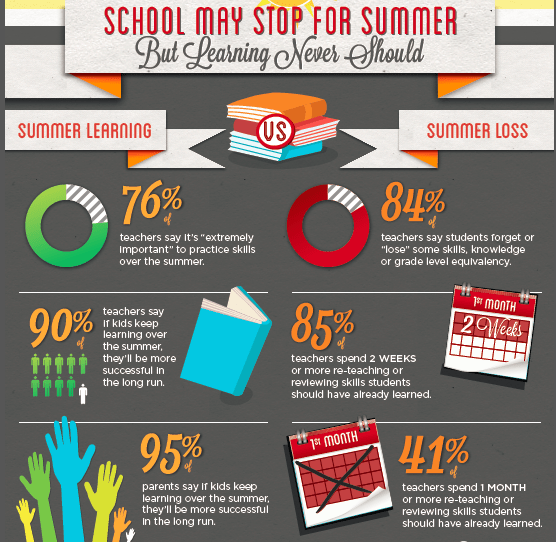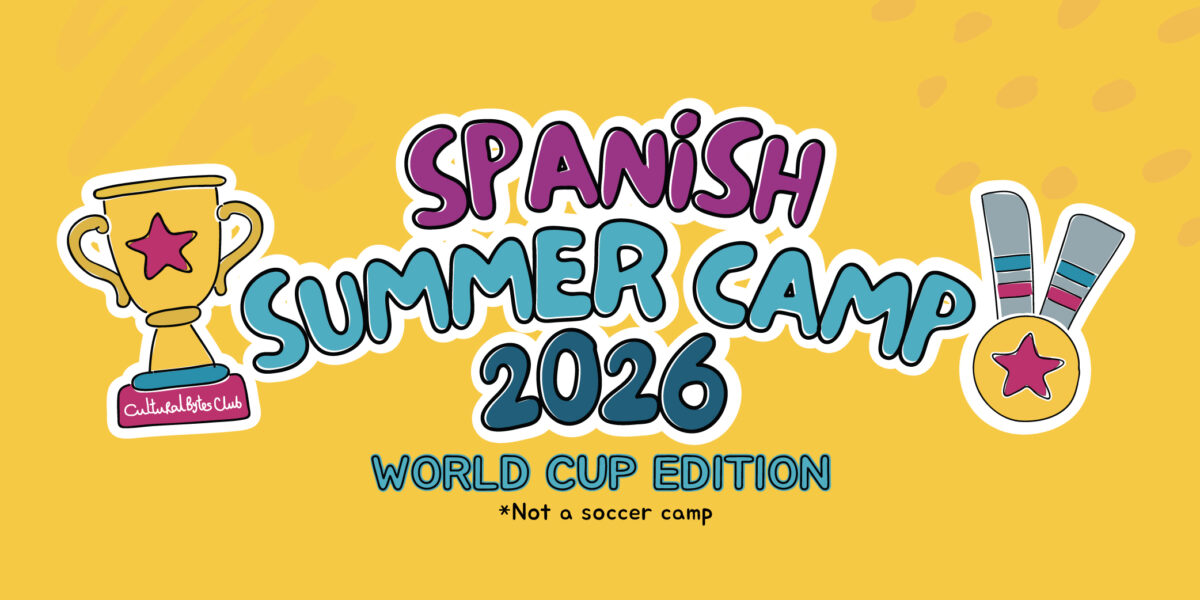What is the Summer Slide?
No, the Summer Slide is not a giant, yellow, curvy slide at the playground – although you should definitely keep your eyes out for one of those for your kids to play on this summer.
“Summer slide” refers to the loss of academic achievement and knowledge over summer break that students gained over the school year. Many students over the summer months lack access to educational resources as well as the motivation for the daily practice required to maintain a skill. As a result, many students experience setbacks heading into the new school year and take up precious time to repeat learning skills rather than moving on to new ones. This can accumulate over time and affect children as they enter their junior high and high school education. The vicious cycle goes something like this:
Summer Slide Statistics
- Only 48% of parents (with children ages 6-17) have heard of summer slide. (Source: Scholastic)
- Kids in grades 3 to 5 lose about 20% of their school year gains in reading and 27% of their gains in math. (Source: Scholastic)
- Students lose about a month’s worth of learning on average over the summer. (Source: Sage Journals)
- In the summer between 5th and 6th grades, 84% of students experience summer slide in math. (Source: Kappan)
- The more kids learn during the school year, the more they’re likely to lose over the summer. (Source: Kappan)
Source: teacherevolution
Eight Tips to Beat the Summer Slide
If you’re feeling discouraged by the statistics, you may be asking yourself what you can do to stop the summer slide or even reverse it. Here are eight tips to beat the summer slide (with an emphasis on language learning):
1. Read, Read, Read.
According to Harvard Education studies, a crucial way to combat the summer slide is to provide “books that are individually matched to children’s interests and reading levels…Children who are at risk for summer reading loss may need help to ensure that they read the books they’re given and that they do so in ways that are likely to build decoding skills, fluency, and comprehension and reading levels.” Take trips to the library every week and ask your child to pick out age appropriate books that they are interested in (a few from their native language and a few in the target language). Another reminder is to read WITH them. Your children value special activities they can do with you and if they see reading is important to you, then it will become important to them.
Read: Must Read Children’s Books for Learning Spanish
2. Write
Reading is only one part of language learning and retention. Reading introduces language, while writing internalizes it and makes it one’s own. Encourage your child to write a daily journal or create a scrapbook of the summer that includes souvenirs, treasures, and notes from their adventures. If your child encounters a new vocabulary word in the target language, have them write it out on a sticky note and place it in a visible place their room.
3. Outdoor Activities
Moving/playing is essential for a child’s physical and emotional wellbeing. Have a garden? Ask your children to help water and tend the plants and throw in a lesson about photosynthesis. Planning a hike? Take advantage of time outdoors to teach a geology lesson about different landforms. Do your kids have too much energy in the house? Take your kids to a playground to keep up their social skills around children their own age.
4. Summer Camps
Summer Camps are one of the best ways to stop the summer slide, and in fact, reverse it. To continue the metaphor, let’s call Summer Camps a “summer ladder” for growing in knowledge and skills. Summer Camps that have a specific focus (such as an outdoor science camp, a language camp, or even a tech camp) will give your child the daily/weekly opportunity to practice and maintain skills they learned in school and set them up for success as they enter into the new school year. Cultural Bytes is offering a top-tier total immersion Spanish Language Camp this summer that runs from June 24th to August 1st. With fun outdoor play, engaging crafts and lessons, and full immersion (ONLY Spanish is allowed to be spoken in our camps), we guarantee that your child’s Spanish will improve over the summer months rather than decline.
Read: How To Choose A Language Summer Camp 2024
Read: List of the Best Virtual Camps to Learn Spanish
5. YouTube and Apps
If you’re going to allow screen time over summer, why not make it productive? Find YouTube channels, Apps, and websites/games that specialize in math, reading, and language skills. Your child will have so much fun singing along to a video or challenging themselves in a game that they won’t even realize they are continuing to learn.
Read: The Best Spanish YouTube Channels for Children by Category
Read: Best Apps to Help My Child Learn Spanish
6. Visit Museums
In the setting of a fun outing, museums are the perfect place to reinforce lessons they have already learned during the school year. They can practice their reading skills by reading the informational plaques below artworks or ancient artifacts. They can practice their math skills by counting the number of items behind a glass display. They can practice their writing skills by writing a summary of the trip when they get home. Whatever skill you want your child to practice, you can find a way to introduce it on a trip to a museum. In addition, bringing your child to a museum will also remind them of the importance of controlling their energy in a public space around others (a good preparation for when the school year starts up again).
Read: The Role of Culture in Language Learning
Read: Top Latino Museums to Visit Near Los Angeles
7. Cook Together
If you want your child to practice a specific skill everyday, incorporate it into an activity that you do everyday anyways – cooking! Cooking utilizes the skills of math (measuring and conversion), of reading (reading the ingredients and instructions of a recipe), and of learning to follow directions. Plus, you get a delicious end product that you can enjoy together. To practice language skills and vocabulary while cooking, choose a recipe from the target language and read the ingredients and instructions in the target language.
Read: Flavors of Latin America Cookbook | Cooking With Valentina
8. Create a Summer Learning Schedule
It has been said that a goal without a plan is just a wish. You can have the best of intentions, but if you don’t have a summer learning plan that you commit to stick to, summer learning/maintenance will most likely not happen for your child and valuable knowledge will be lost. Craft a weekly learning plan around specific, time-bound goals that you have for your child. Encourage kids to learn all summer long with reading logs, bingo cards, goals worksheets, and rewards that they can look forward to. And don’t forget to have fun together!
Read: How to Create a Spanish Curriculum for Homeschooling
Read: How to Set Effective Goals for Language Learning
In Summary:
Summer time is a break from school, but it doesn’t mean your child has to take a break from learning! To avoid the loss of knowledge that happens over the summer months, set in place a plan now that encourages your children to keep up valuable skills so that they are best prepared for the upcoming school year.
For language learning help for kids, check out Cultural Bytes Online and In Person classes.











